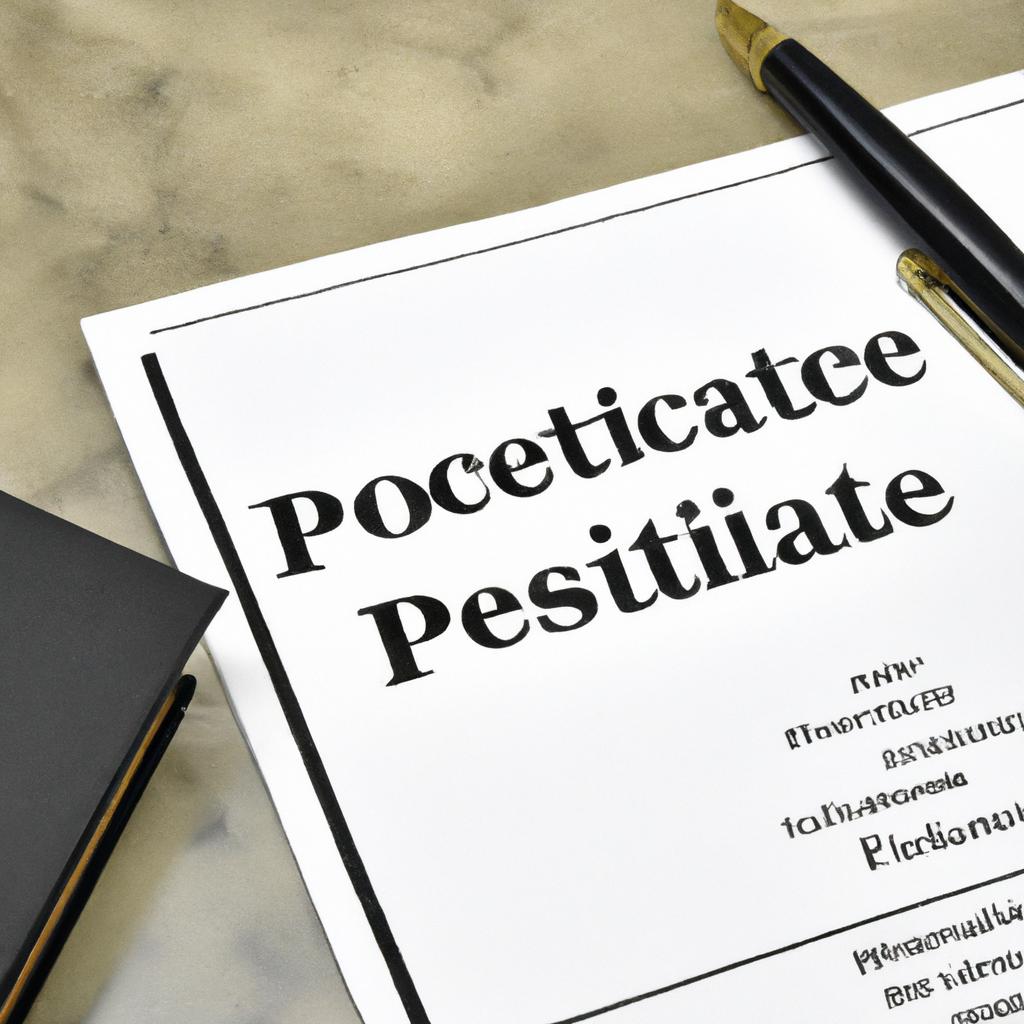In the intricate realm of estate administration, navigating the complexities of petitioning the probate court is a crucial step in ensuring the proper distribution of assets according to a deceased individual’s wishes. As experienced attorneys at Morgan Legal Group, located in the bustling metropolis of New York City, we understand the importance of this process and are dedicated to guiding our clients through the intricacies of probate law with precision and expertise. Join us as we delve into the intricacies of petitioning the probate court and unravel the legal intricacies involved in this essential aspect of estate planning.
Initiating the Petition Process in Probate Court
When , it is essential to understand the necessary steps to ensure a smooth and successful outcome. The first step is to gather all relevant documents, including the deceased individual’s will, death certificate, and any other pertinent paperwork. It is crucial to have all documentation in order to avoid delays or complications in the probate process. Once the documents are gathered, the next step is to file a petition with the probate court. This petition will formally begin the probate process and allow the court to oversee the distribution of the deceased individual’s assets.
- Collect all relevant documentation
- File a petition with the probate court
- Begin the probate process
After filing the petition, the court will schedule a hearing to review the case. During the hearing, the court will evaluate the validity of the will, appoint an executor or personal representative, and address any disputes or challenges to the estate. It is important to be prepared for the hearing and to provide any necessary evidence to support your case. The court will then issue an order officially granting probate and allowing the executor to begin the process of estate administration, including distributing assets to beneficiaries and settling debts.
- Attend the court hearing
- Provide necessary evidence
- Receive probate order

Navigating the Complexities of Filing a Petition for Probate
When filing a petition for probate, it is crucial to understand the intricate process involved in navigating the complexities of probate court. This legal procedure can be overwhelming for individuals who are unfamiliar with the legal system. It requires meticulous attention to detail and adherence to strict deadlines. At Morgan Legal Group, our team of experienced probate attorneys is here to guide you through each step of the process to ensure a smooth and successful probate proceeding.
One of the key aspects of filing a petition for probate is gathering all necessary documentation and information. This includes identifying and valuing the assets of the deceased, determining any outstanding debts or liabilities, and locating beneficiaries. Our attorneys can assist you in compiling a comprehensive list of assets and debts, preparing the necessary paperwork, and representing you in probate court. With our expertise and guidance, you can trust that your loved one’s estate will be managed effectively and in accordance with the law. Trust Morgan Legal Group to handle your probate matters with professionalism and diligence.
| Assets | Debts |
|---|---|
| Real Estate | Mortgage |
| Bank Accounts | Credit Card Debt |
| Investment Accounts | Medical Bills |

Understanding the Requirements for a Successful Petition in Probate Court
In order to file a successful petition in probate court, it is crucial to understand the specific requirements that must be met. The first step is to ensure that the petition is filed in the correct jurisdiction and includes all necessary information. This includes the name of the deceased, the date of death, and a list of the deceased’s assets and liabilities.
<p>Additionally, it is important to gather all relevant documentation to support the petition, such as the deceased's will or any relevant court orders. Finally, it is essential to follow all procedural rules and deadlines set forth by the court to avoid delays or dismissal of the petition.</p>
Effective Strategies for Presenting a Petition in Probate Court
When presenting a petition in probate court, it is crucial to follow effective strategies to increase the chances of success. One key strategy is to ensure that the petition is clear, concise, and well-organized. Clearly outline the purpose of the petition, the relief sought, and the legal basis for the request. Use bold headings and bullet points to highlight key points and make the petition easy to follow.
- Clearly outline the purpose of the petition
- Provide a detailed explanation of the relief sought
- Ensure that the legal basis for the request is clearly stated
Another important strategy is to gather and present evidence to support the petition. Include any relevant documents, such as contracts, agreements, and correspondence, to strengthen your case. Arrange the evidence in a logical order and reference it in the petition to demonstrate its relevance.
- Gather and present evidence to support the petition
- Include relevant documents to strengthen your case
- Arrange the evidence in a logical order and reference it in the petition
Q&A
Q: What is a probate court?
A: A probate court is a specialized court that handles matters relating to the estate of deceased individuals, including the distribution of assets and the resolution of any disputes.
Q: Why would someone need to petition the probate court?
A: Someone may need to petition the probate court in order to gain legal authority to manage and distribute the assets of a deceased individual’s estate.
Q: What is the process for petitioning the probate court?
A: The process for petitioning the probate court may vary depending on the specific circumstances, but typically involves filing a petition with the court, providing notice to interested parties, attending a hearing, and obtaining a court order granting the requested relief.
Q: What types of issues can be resolved through the probate court?
A: The probate court can address a variety of issues related to the estate of a deceased individual, including the validity of a will, the appointment of an executor or administrator, the distribution of assets, and the resolution of any disputes among heirs or beneficiaries.
Q: Are there any alternatives to petitioning the probate court?
A: In some cases, it may be possible to avoid probate court altogether by using strategies such as creating a revocable trust or designating beneficiaries on certain assets. However, in many cases, petitioning the probate court may be necessary to properly administer the estate.
The Way Forward
In conclusion, petitioning the probate court can provide a necessary avenue for addressing legal matters related to estates, guardianships, and other important issues. By following the proper procedures and working with legal professionals, individuals can navigate the complexities of probate court with confidence. Whether seeking to resolve a dispute or ensure the proper distribution of assets, petitioning the probate court is a vital step in achieving a fair and just outcome. Thank you for reading and may your journey through the probate court be smooth and successful.
 Petition Probate Court: Understanding the Process and Its Benefits
Petition Probate Court: Understanding the Process and Its Benefits
Handling legal matters after the passing of a loved one can be a difficult and emotional process. In addition to mourning their loss, there are practical and legal aspects that must be addressed. One of these important tasks is navigating the petition probate court process. Whether you are named as an executor in a will or need to petition the court to become an administrator, understanding the ins and outs of this process is crucial. In this article, we will break down what it means to petition probate court and why it is an essential step in managing a deceased person’s estate.
What is Petition Probate Court?
Petition probate court is the legal process of reviewing and settling the estate of a deceased person. It involves presenting a petition to the court to initiate the probate process and appoint a person to act as the personal representative or executor of the estate. This person is responsible for managing and distributing the deceased person’s assets, paying any debts and taxes, and ultimately closing the estate.
The main purpose of petition probate court is to ensure that the deceased person’s property is properly distributed according to their wishes or state law. It also provides a way to resolve any disputes that may arise among family members or creditors. The probate court oversees the entire process and ensures that everything is done according to the law.
Reasons for Petitioning Probate Court
There are several reasons why someone might need to petition probate court, including:
1. No Will or Trust: If the deceased person did not have a will or trust in place, their estate must go through probate.
2. Validity of a Will: If a will is contested, the court will decide if it is valid and should be followed.
3. Necessary for Legal Transfers: Probate court is required if the estate holds property or assets that do not have a designated beneficiary or are solely in the name of the deceased person.
4. Protecting the Rights of Heirs and Creditors: The probate process ensures that the rights of heirs and creditors are protected and that the estate is distributed fairly.
Steps Involved in Petitioning Probate Court
The probate process involves several steps, and it is essential to understand each one to ensure a smooth and efficient process:
1. Filing a Petition: The first step is to file a petition with the probate court in the county where the deceased person lived. The petition should include basic information about the deceased, such as their name, date of death, and any known heirs.
2. Appointing a Personal Representative: After filing the petition, the court will appoint a personal representative or executor to manage the estate. This person is typically named in the deceased person’s will or chosen by the court if there is no will.
3. Notifying Heirs and Creditors: The personal representative is responsible for notifying all heirs and creditors of the probate proceedings. This includes publishing a notice in a local newspaper, sending letters to known creditors, and notifying any interested parties.
4. Taking Inventory: The personal representative must take inventory of all assets and debts of the estate. This includes bank accounts, investments, property, and any outstanding debts.
5. Paying Debts and Taxes: The personal representative is responsible for paying off any outstanding debts and taxes of the estate using assets from the deceased person’s estate.
6. Distributing Assets: Once all debts and taxes are paid, the personal representative can distribute the remaining assets of the estate to the heirs according to the deceased person’s wishes or state law.
Benefits of Petitioning Probate Court
While the probate process can seem daunting, there are several benefits to petitioning probate court, including:
1. Legal Protection: Going through probate court provides legal protection against any claims or disputes that may arise from beneficiaries or creditors.
2. Transparency: The probate process is transparent, and all actions of the personal representative must be reported to the court, providing accountability and ensuring fairness among heirs.
3. Clearing Title of Property: Probate allows for the transfer of any property held solely by the deceased person, providing clear title for heirs to inherit or sell.
4. Tax Benefits: Probate can provide tax benefits through deductions and minimizing potential estate tax liabilities.
Tips for a Smooth Probate Process
1. Start early: The probate process can take several months to complete, so it is essential to start as soon as possible.
2. Get organized: Keep all important documents, including the will, death certificate, and financial statements, in one place for easy access.
3. Seek Professional Help: It is highly recommended to seek the assistance of a probate attorney to guide you through the process and ensure all legal requirements are met.
Conclusion
Navigating the petition probate court process can be challenging, but it is an essential step in managing a deceased person’s estate. By understanding the process, its benefits, and seeking professional help, you can ensure a smooth and efficient probate process. Remember to start early, stay organized, and seek assistance when needed. While it may be a difficult time, going through probate court can bring closure to the estate and provide peace of mind for all involved.


